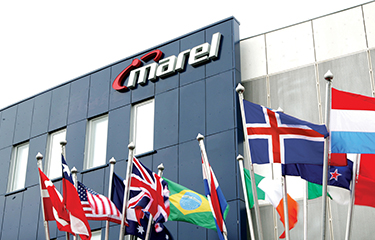Gardabaer, Iceland-based Marel announced today that it has rejected an unsolicited takeover bid from John Bean Technologies Corporation (JBT), a U.S.-based technology solutions provider.
JBT submitted a non-binding initial proposal to the board of directors of Marel on 24 November which would have seen 100 percent of shares in the Icelandic company transferred to JBT.
JBT also said in its announcement of the takeover bid that it received an irrevocable undertaking and entered into exclusivity with the 24.7 percent of Marel shares owned by Eyrir Invest, an investment company located in Reykjavik, Iceland.
“JBT´s non-binding proposal is consistent with the company’s strategic plan and M&A objective of pursuing transactions with strong industrial logic and significant synergy potential while maintaining a strong balance sheet and preserving future strategic flexibility,” JBT said in its announcement.
JBT said it did not intend to reveal any further details of the proposed acquisition “unless and until its board determines that it is required or appropriate to do so.”
Marel said that after “carefully evaluating” the proposal, its board of directors decided to decline the offer.
“The board unanimously agreed that the proposal is not in the best interests of Marel’s shareholders since it does not account for the intrinsic value of the business as well as the inherent risk of executing the proposed transaction,” Marel said.
Marel added that “as previously communicated,” the company still sees benefits in further consolidation of the processing equipment sector and that it plans to continue executing that strategy.
The acquisition proposal came roughly one month after Marel released its Q3 2023 results, which highlighted its revenue, adjusted earnings before interest and taxes (EBIT), orders received, and order book were all down year-over-year.
The company saw revenue of EUR 403.6 million (USD 442.9 million) in Q3 2023, down 10.4 percent year-over-year. The company’s adjusted EBIT dropped even further, decreasing by 21.4 percent to EUR 36.3 million (USD 39.8 million). The company’s orders received dropped 8.5 percent to EUR 390.8 million (USD 428.8 million), and its order book was down 25.2 percent to EUR 561.7 million (USD 616.4 million).
The company said that market conditions continued to create uncertainty for its orders pipeline and that costs have remained high as the easing of inflation on material costs was offset by high labor inflation for Marel’s customers.
Then-CEO Arni Oddur Thordarson said the fourth quarter started off well and that the long-term growth outlook for the segment “remains intact.”
“As a pure-play in the food processing industry, Marel is at the center point of the structural trends of automation, digitalization and decarbonization that are defining the market today,” he said.
Thordarson went on to resign from his position on 7 November, citing “personal reasons.”
While Marel declined the sale, it had an overall positive effect on the company’s share price. According to the Nasdaq Capital Market, Marel’s share price increased from ISK 350 (USD 2.55, EUR 2.32) on 23 November to its most recent close of ISK 429 (USD 3.12, EUR 2.84) per share.
Photo courtesy of Marel







